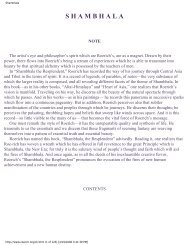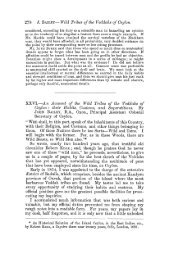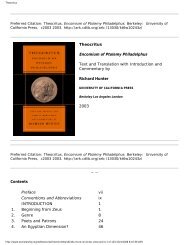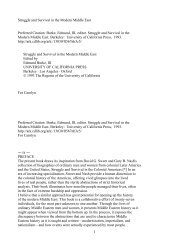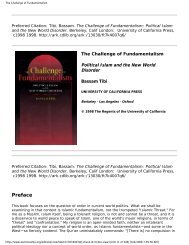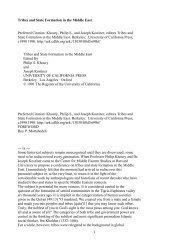Between Two Worlds Kafadar.pdf
Between Two Worlds Kafadar.pdf
Between Two Worlds Kafadar.pdf
Create successful ePaper yourself
Turn your PDF publications into a flip-book with our unique Google optimized e-Paper software.
und türkische Geschichtswissenschaft: Die Saldschuken im Urteil moderner<br />
türkischer Historiker (Berlin, 1984); Michael Ursinus, "Byzantine History in<br />
Late Ottoman Turkish Historiography," BMGS 10(1986):211-22; idem, "'Der<br />
schlechteste Staat': Ahmed Midhat Efendi (1844-1913) on Byzantine Institutions,"<br />
RMGS 11(1987):237-43; idem, "From Süleyman Pasha to Mehmet Fuat Küprülü: Roman<br />
and Byzantine History in Late Ottoman Historiography," BMGS 12 (1988): 305-14.<br />
The translations by Gary Leiser in part serve a similar end of stocktaking,<br />
especially since they are enlarged with annotations, additional footnotes, and<br />
introductions, even though the introductions are not critical: A History of the<br />
Seljuks: Ibrahim * Kafesoglu's * Interpretation and the Resulting Controversy<br />
(Carbondale and Edwardsville, 1988); M. F. Küprülü, The Origins of the Ottoman<br />
Empire (Albany, 1992); idem, Some Observations on the Influence of Byzantine<br />
Institutions on Ottoman Institutions (Ankara, 1993); and idem, Islam in Anatolia<br />
after the Turkish Invasion (Salt Lake City, 1993). For works on the gaza thesis,<br />
see n. 56 in chapter I below. Hereafter, the simplified spelling of "gaza" will<br />
be used.<br />
Introduction<br />
1. Albert Hourani, "How Should We Write the History of the Middle East?" IJMES<br />
23 (1991):130. The name of the eponym of the dynasty will hereafter be spelled<br />
in its simplified form of "Osman," primarily for the sake of practicality. It<br />
is, moreover, uncertain that his given name was `Osman * , from the Arabic<br />
`Uthman * , as will be argued in chapter 3.<br />
2. This usage does not appear in European languages but was common in Arabic,<br />
Persian, and Turkish.<br />
3. Both the politico-military and the religio-cultural history of those four<br />
centuries is given magisterial treatment in Speros Vryonis, The Decline of<br />
Medieval Hellenism in Asia Minor and the Process of Islamization from the<br />
Eleventh through the Fifteenth Century (Berkeley, 1971).<br />
4. Claude Cahen, "Kilidj Arslan II," EI, new ed., s.v.<br />
5. Ibid. For a general survey of Seljuk history (as well as the histories of<br />
other Turco-Muslim polities and populations) in Anatolia, see idem, La Turquie<br />
préottomane (Istanbul, 1988); also see Osman Turan, Selçuklular Zamaninda<br />
Türkiye (Istanbul, 1971). The Seljuks of Rum * are seen within the larger<br />
context of Seljuk history in the Middle East in idem, Selçuklular Tarihi ve<br />
Turk-Islam * Medeniyeti, 4th enl. ed. (Istanbul, 1993), and in Gary Leiser,<br />
trans. and ed., A History of the Seljuks: Ibrahim Kafesoglu's * Interpretation<br />
and the Resulting Controversy.<br />
6. For the background, causes, and unfolding of the rebellion, see Ahmet Yasar *<br />
Ocak, Babaîler Isyani * (Istanbul, 1980).<br />
7. On Seljuk caravanserais, see Kurt Erdmann, Das anatolische Karavanserail des<br />
13. Jahrhunderts (Tübingen, 1961); and M. Kemal Özergin, "Anadolu'da Selçuklu<br />
Kervansaraylari," Tarih Dergisi 15 (1965):141-70. The most recent treatment of<br />
the world economy in the relevant era is Janet Abu Lughod, Before European<br />
Economy: The World System, A.D. 1250-1350 (New York, 1989). A detailed look at<br />
the changes in medieval Anatolian economy after the Turkish invasions is<br />
included in Michael Hendy, Studies in the Byzantine Monetary Economy, c.<br />
300-1450 (Cambridge, 1985).<br />
8. Elizabeth A. Zachariadou, Trade and Crusade: Venetian Crete and the Emirates<br />
of Menteshe and Aydin (1300-1415) (Venice, 1983). On the international fair, see<br />
136




